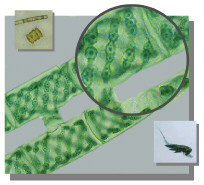Algal Identification and Enumeration |
|

The identification and enumeration of algae in lakes and other freshwater ecosystems provides a simple, reliable, and cost-effective measure of water quality. As the major primary producers in aquatic ecosystems, algae play an important role in energy flow and nutrient cycling. Algal blooms may indicate excessive nutrient loading, pollution, or other environmental problems. Determination of the numbers and types of algae present in a water body is useful in environmental monitoring programs and impairment assessments, because these characteristics respond quickly to changes in water chemistry. Because of their short life cycle, changes in water quality are often reflected by changes in the algal community within a few days or weeks.
In addition to their value in biological monitoring programs, some algae can become problematic. Excessive algal growth can cause a number of water-quality problems, including: bad taste and odor, deoxygenation of water, and fish kills. Some blooms are toxic to wildlife and humans. Clogged pipes, filters, or screens in water and wastewater treatment plants are other problems caused by excessive algal growth, resulting in increased costs to water utilities and municipalities. Correct identification of target species is critical when determining a management strategy.
Water's Edge Scientific LLC provides analysis of water samples for identification and enumeration of algae and zooplankton. Due to increasing state and federal regulations requiring biological monitoring of aquatic systems for water quality studies, risk assessments, and other aquatic surveys, there is a growing need for specialized services within this realm.
We will calculate any biotic index values or diversity indices that our clients require, and we can help clients determine the most appropriate metrics for their situation. We can also provide clients with permanent mounts or photographic records of samples.

Algal cell counts are typically performed under an Olympus inverted microscope using the Utermohl sedimentation technique, which is a highly reliable and accurate method. Both phytoplankton (free-floating algae) and periphyton (attached algae) samples are accepted. Algae are identified to the lowest practical taxonomic level. Samples are analyzed by a trained and experienced Master's level aquatic biologist. Methods used for sample processing and data analysis follow federal and state regulatory agency guidelines, and we follow strict quality control procedures so that our clients may have confidence in our results. All quality control information is available to clients. Clients may choose to receive their data and reports in electronic format, as well as in hard copy.
Zooplankton counts are performed using a Leica stereozoom microscope. Crustacean zooplankton are typically identified to species where possible; rotifers are identified to genus. Biomass is estimated by fitting length measurements to appropriate regression equations.
Our services are provided to engineering firms, environmental consultants, water companies, lake associations, aquaculturists, golf courses, public institutions, landowners, and others requiring a biological approach to water quality issues. Preserved samples for algae or invertebrate analysis are accepted from clients throughout the United States. Upon request, Water's Edge Scientific LLC will also perform field sampling for algae, zooplankton, or invertebrate studies. Field sampling done by the corporation is currently limited to the upper Midwest.
Due to the variability of project specifications, we will be happy to provide a price quote based on your specific project needs.
Please contact us for more information regarding services, pricing, and sample submission guidelines.